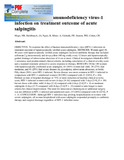| dc.description.abstract | OBJECTIVE:
To examine the effect of human immunodeficiency virus (HIV)-1 infection on treatment outcome of laparoscopically verified acute salpingitis.
METHODS:
Women aged 18-40 years with laparoscopically verified acute salpingitis received antibiotic therapy that included cefotetan 2 g intravenously and doxycycline 100 mg orally every 12 hours and laparoscopically guided drainage of tuboovarian abscesses of 4 cm or more. Clinical investigators blinded to HIV-1 serostatus used predetermined clinical criteria, including calculation of a clinical severity score and a standard treatment protocol to assess response to therapy.
RESULTS:
Of the 140 women with laparoscopically confirmed acute salpingitis, 61 (44%) women had mild, 38 (27%) had moderate, and 41 (29%) had severe disease (ie, pyosalpinx, tuboovarian abscesses, or both). Fifty-three (38%) were HIV-1-infected. Severe disease was more common in HIV-1-infected in comparison with HIV-1-uninfected women (20 [38%] compared with 21 [24%], P = .02). Defined as time of hospital discharge or 75% or more reduction in baseline clinical severity score, HIV-1-infected women with severe (6 days [4-16] compared with 5 days [3-9], P = .09) but not those with either mild (4 days [2-6] compared with 4 days [2-6] P = .4) or moderate salpingitis (4 days [3-7] compared with 4 days [3-6] P = .32) tended to take longer to meet criteria for clinical improvement. The need for intravenous clindamycin or additional surgery was not different in HIV-1-infected and uninfected cases (15 [28%] compared with 18 [21%], P = .3).
CONCLUSION:
Although HIV-1 infection may prolong hospitalization in women with severe salpingitis, all women hospitalized with acute salpingitis responded promptly to antibiotic therapy and surgical drainage regardless of HIV-1 infection status. | en |

